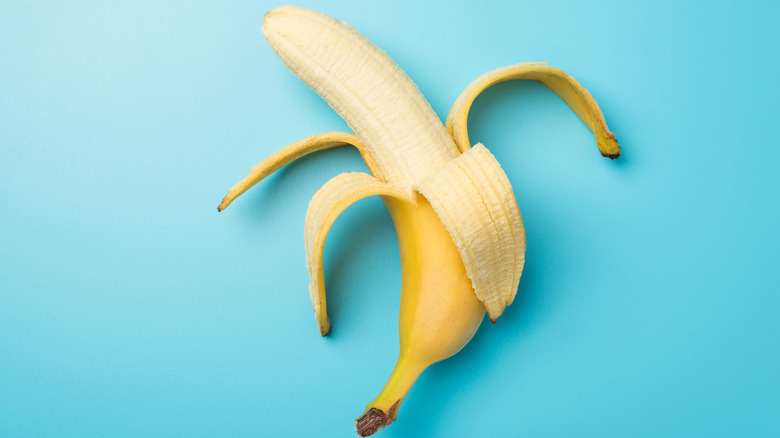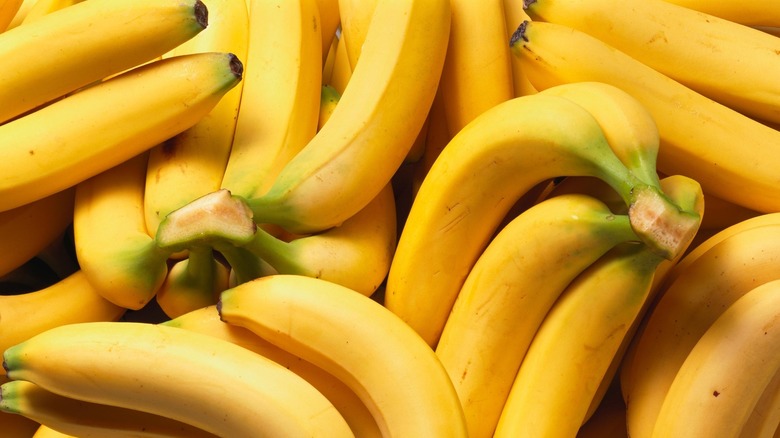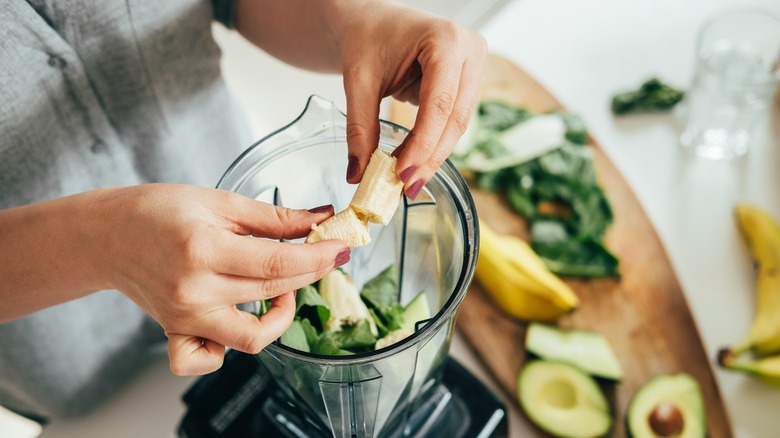How Much Potassium Is Really In A Single Banana?
Bananas are widely recognized as nutritional heroes when it comes to potassium. Although many recognize this nutrient is important for things like hydration or cramped muscles, not everyone knows how it works or how much they need each day. This context matters when you're considering how much potassium is in a banana. A medium banana has about 422 milligrams of the stuff, which sounds like a lot, but is it?
To get to the bottom of this, it's helpful to know how potassium works. On a basic level, this mineral maintains fluid balance and nerve function. On a nerdier level, potassium works alongside sodium to maintain the balance of fluid in and out of cells through an electrochemical gradient in cell membranes. In fact, potassium is part of the reason bananas are ever so slightly radioactive, but that's another story. This mechanism impacts blood pressure — when sodium intake is too high and potassium levels are too low, high blood pressure risk rises, and conversely, increasing potassium intake can lower blood pressure.
Since bodies need a lot of potassium to function, and high blood pressure is such a pervasive condition, most people could benefit from eating more potassium. The exception to this is those with kidney disease or who take certain medications that raise potassium levels in the blood. Both groups can benefit from knowing how much potassium is in foods like bananas. But, as with many nutrition questions, the answer is more complex than a single number.
Sizing up the potassium content of bananas
The potassium content of a banana can vary widely based on its size, with a small banana (six inches or less) containing 290 milligrams, and a large banana (nine inches or more) containing 544 milligrams, both significantly different than our medium banana example.
The way you prepare bananas plays a very small role in the potassium game, with fried bananas only having four milligrams less potassium than raw. Ripening also isn't a major factor, as this impacts the development of flavor-rich compounds called esters in bananas as well as their carbohydrate composition, but not potassium levels.
It's worth noting that we consume the Cavendish variety of bananas today, which contains 358 milligrams of potassium per 100-gram serving, but another popular member of the banana family, the plantain, offers a bit more at 487 milligrams. This is all to say that while bananas are a reliable source of potassium, the actual amount can differ based on the variety of bananas and their size.
Bananas and their sidekicks
While bananas get a lot of attention for their affordability and their potassium content, they're far from the most extraordinary source of this nutrient. To put this in perspective, the percent daily value (or the amount needed to meet 97-98% of people's needs) for potassium is 4700 milligrams. A medium banana contributes to 9% of this, which isn't insignificant, but it does mean you'd have to eat quite a few bananas to meet your potassium needs with this food alone.
Luckily, there are plenty of additional — and sometimes more potent — ways to get potassium into your diet. For example, half a cup of dried apricots packs 755 milligrams of potassium, which is about 16% of the daily value. Other dried fruits like prunes and raisins are also good sources of potassium. Protein-rich foods like cooked lentils (with 731 milligrams per cup) as well as yogurt and chicken are also nutritious options, as are vegetables like acorn squash, spinach, and potatoes. Incorporating a mix of these foods ensures that you not only meet your potassium needs, but you enjoy a wide range of flavors too.


